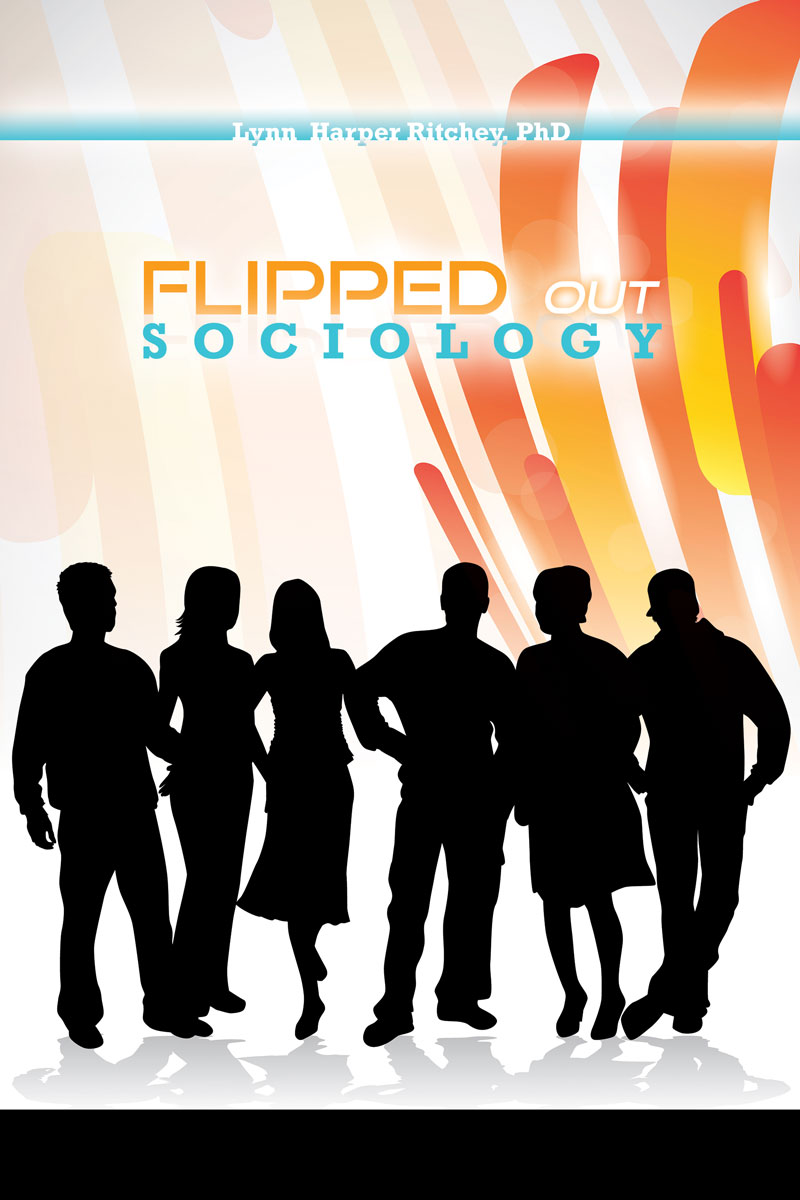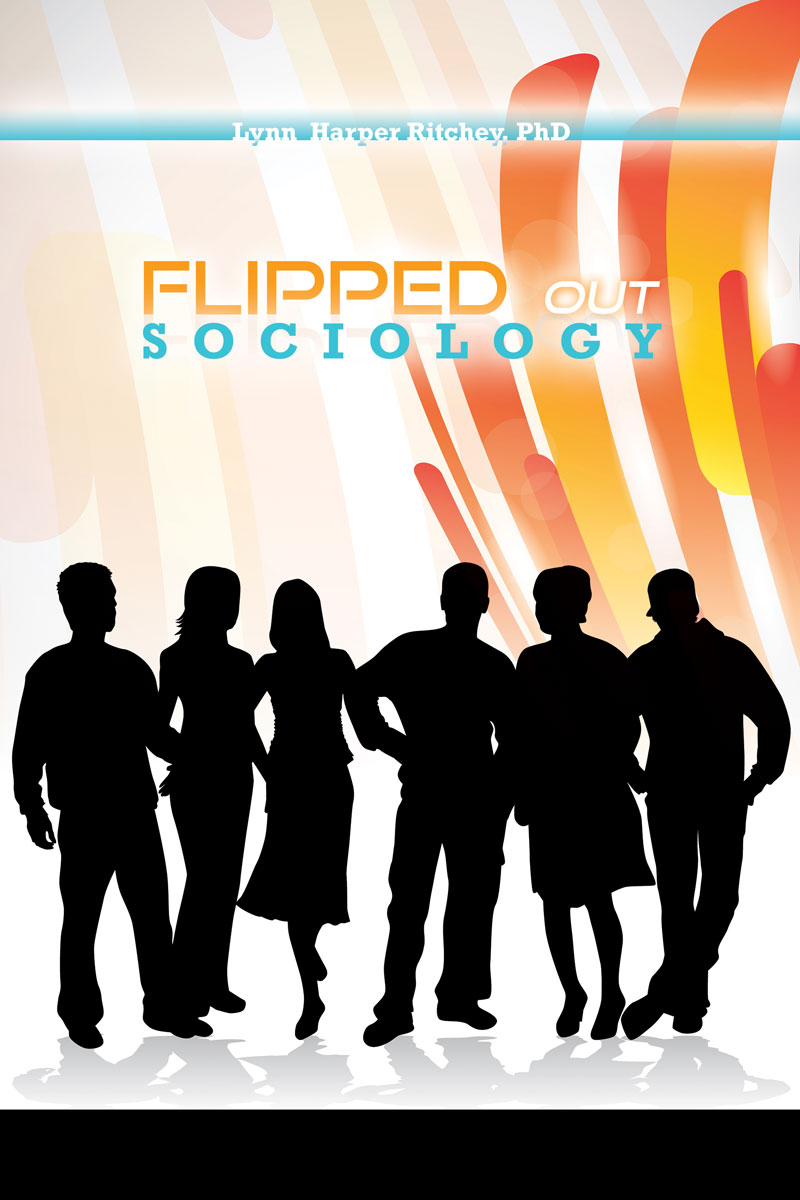Flipped Out Sociology
Author(s): Lynn Harper Ritchey
Edition: 1
Copyright: 2017
Flipped Out Sociology is designed specifically for flipped, hybrid/blended, and online introductory sociology courses. This introduction to sociology provides an interactive and active online environment to explore basic sociological perspectives and concepts. Modules cover the following topics:
- The Sociological Imaginations and the Scientific Method
- Sociological Perspectives
- Culture and Socialization
- Social Order
- Societal Types and Population Dynamics
- Economic Institution
- Political Institution
- Religion Institution
- Education Institution
- Family Institution
- Stratification
- Social Change and Social Movements
Flipped Out Sociology is designed to meet the needs of a variety of student populations. Instructors can focus on just the individual assignments. These provide students an interactive learning format for exploring sociological perspectives and concepts online via short videos, articles and interactive websites.
To move to a more active learning online environment, instructors can add the discussion board project where students create a new society using their sociological imagination and course concepts. Discussion board assignments provide students with additional online resources for a deeper understanding of their social world. Instructors using a more traditional textbook can use the discussion board assignments to engage students in a semester long project that generates interesting discussions – online and face-to-face.
Week 1 Module – Sociological Imagination
Week 2 Module—Sociological Perspectives
Week 3 Module—Components of Culture
Week 4 Module—Social Order
Week 5 Module—Societal Types
Week 6 Module—Economic Institution
Week 7 Module—Policy Institution
Week 8 Module—Religion Institution
Week 9 Module—Education Institution
Week 10 Module—Family Institution
Week 11 Module—Stratification
Week 12 Module—Social Change
Dr. Lynn Harper Ritchey has been at the University of Cincinnati, UC Blue Ash (UCBA) since 1996. She received her BA (Sociology/Psychology) and MA (Sociology) from the University of Toledo and her PhD from the University of Cincinnati (Sociology). Dr. Ritchey has several publications including two peer reviewed resource guides for the American Sociological Association (Teaching Introduction to Sociology as a Hybrid Course: A Resource Guide and Scaffolding for Student Success in Learning: Effective Practices in Using Instructional Strategies). She has consulted with publishers on various aspects of integrating active learning components into the traditional and online classroom. Professor Ritchey’s approach to teaching is student-centered focused on individualizing instruction to student interest(s). She has been recognized by her colleagues for her excellence in the classroom by being inducted into University of Cincinnati’s Academy of Fellows for Teaching and Learning, receiving the North Central Sociological Association’s John F. Schnabel Award for Distinguished Contributions to Teaching Sociology, and the University of Cincinnati: Blue Ash’s Diversity is Beautiful Award.
Flipped Out Sociology is designed specifically for flipped, hybrid/blended, and online introductory sociology courses. This introduction to sociology provides an interactive and active online environment to explore basic sociological perspectives and concepts. Modules cover the following topics:
- The Sociological Imaginations and the Scientific Method
- Sociological Perspectives
- Culture and Socialization
- Social Order
- Societal Types and Population Dynamics
- Economic Institution
- Political Institution
- Religion Institution
- Education Institution
- Family Institution
- Stratification
- Social Change and Social Movements
Flipped Out Sociology is designed to meet the needs of a variety of student populations. Instructors can focus on just the individual assignments. These provide students an interactive learning format for exploring sociological perspectives and concepts online via short videos, articles and interactive websites.
To move to a more active learning online environment, instructors can add the discussion board project where students create a new society using their sociological imagination and course concepts. Discussion board assignments provide students with additional online resources for a deeper understanding of their social world. Instructors using a more traditional textbook can use the discussion board assignments to engage students in a semester long project that generates interesting discussions – online and face-to-face.
Week 1 Module – Sociological Imagination
Week 2 Module—Sociological Perspectives
Week 3 Module—Components of Culture
Week 4 Module—Social Order
Week 5 Module—Societal Types
Week 6 Module—Economic Institution
Week 7 Module—Policy Institution
Week 8 Module—Religion Institution
Week 9 Module—Education Institution
Week 10 Module—Family Institution
Week 11 Module—Stratification
Week 12 Module—Social Change
Dr. Lynn Harper Ritchey has been at the University of Cincinnati, UC Blue Ash (UCBA) since 1996. She received her BA (Sociology/Psychology) and MA (Sociology) from the University of Toledo and her PhD from the University of Cincinnati (Sociology). Dr. Ritchey has several publications including two peer reviewed resource guides for the American Sociological Association (Teaching Introduction to Sociology as a Hybrid Course: A Resource Guide and Scaffolding for Student Success in Learning: Effective Practices in Using Instructional Strategies). She has consulted with publishers on various aspects of integrating active learning components into the traditional and online classroom. Professor Ritchey’s approach to teaching is student-centered focused on individualizing instruction to student interest(s). She has been recognized by her colleagues for her excellence in the classroom by being inducted into University of Cincinnati’s Academy of Fellows for Teaching and Learning, receiving the North Central Sociological Association’s John F. Schnabel Award for Distinguished Contributions to Teaching Sociology, and the University of Cincinnati: Blue Ash’s Diversity is Beautiful Award.

